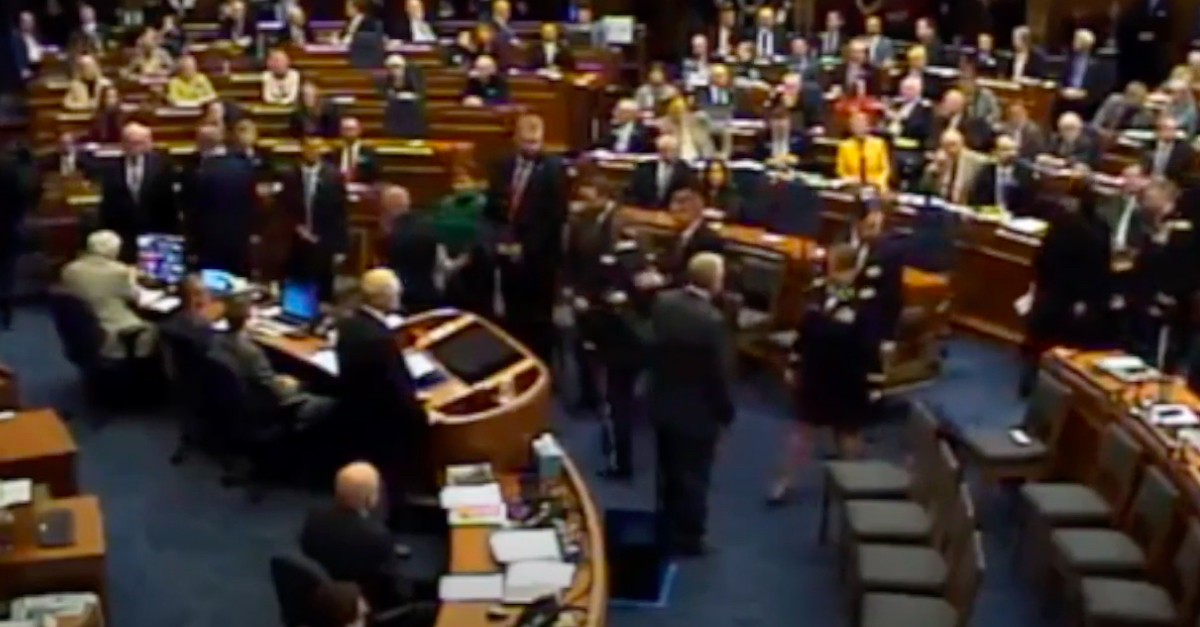
Republicans in North Dakota’s state legislature are targeting the civil liability protections afforded to social media companies like Twitter and Facebook with a new bill that would make it illegal to “censor” users. Unfortunately for those hoping the measure would be a crippling legal salvo in the war on “cancel culture,” attorneys who have reviewed the measure say it’s an unconstitutional and self-contradictory mess that’s impossible to enforce.
The bill, titled “an Act to permit civil actions against social media sites for censoring speech,” is the state’s attempt to circumvent the Section 230 of the Communications Decency Act of 1996, the widely misunderstood law that protects internet companies from being held liable for content created by third-parties that is hosted on their websites. The federal law has drawn the ire of some Republicans who characterize it as a tool which allows internet companies and websites to censor conservative voices while claiming they are neither editors nor publishers for the purposes of civil immunity.
The actual Section 230 language that is the subject of frequent Republican ire is follows:
(1)Treatment of publisher or speaker
No provider or user of an interactive computer service shall be treated as the publisher or speaker of any information provided by another information content provider.
(2)Civil liability
No provider or user of an interactive computer service shall be held liable on account of —
(A)any action voluntarily taken in good faith to restrict access to or availability of material that the provider or user considers to be obscene, lewd, lascivious, filthy, excessively violent, harassing, or otherwise objectionable, whether or not such material is constitutionally protected; or
(B)any action taken to enable or make available to information content providers or others the technical means to restrict access to material described in paragraph (1).
The North Dakota bill states that “interactive computer services” and “social media websites” would be “liable in a civil action for damages to the person whose speech is restricted, censored, or suppressed, and to any person who reasonably otherwise would have received the writing, speech, or publication.”
As First Amendment attorney Ari Cohn pointed out, laws that attempt to curate the content carried by a social media company violate that company’s constitutional right to free speech.
“While it’s nice to know that these legislators would want to make it against the law for a website to ban a murderous tyrant, the fact is that this plainly violates the First Amendment,” he wrote. “I’m not sure how many times we need to go over this: it is unconstitutional for the government to attempt to force websites to carry expression against their will. This is settled First Amendment law, and it is so whether that decision is based on viewpoint or anything else.”
Additionally, because the measure creates a cause of action for restricting information people in North Dakota “would have received,” it effectively applies to all content moderation, regardless of where it was originally created.
“The net effect of that is that it applies to everything everywhere, because people in North Dakota could receive expression from anyone in the world. So if one North Dakota psycho wants to hear from the murderous tyrant, Twitter can’t ban them. These people must be on drugs,” Cohn wrote.
In an addendum added to the bill this week, the legislators also included an “aiding and abetting” cause of action, meaning that any person who reports content that is later taken down would be liable for damages.
“Now they are authorizing Nazis to sue you if you report their content to Twitter,” commercial litigator and legal commentator Akiva Cohen said of the latest addition to the law.
Both attorneys also noted that the North Dakota law would be preempted by liability protections already enshrined in federal law through the Supremacy Clause of the Constitution.
“Again, it’s completely ineffective because it applies only to moderator conduct for which the social media company could be sued under federal law – which right now is effectively a null set – but [t]he question still remains: Why does the ND legislature think “reporting a *literal* neo-Nazi to twitter for recruiting on the platform” is conduct that should subject the reporting user to civil liability? Would love to see a ND-based journalist ask.”
In response to an inquiry from Law&Crime, Rep. Tom Kading, the bills sponsor, defended the legislation.
“Social media may still censor within the constraints of Section 230. For example censorship of obscene, lewd, lascivious, filthy, excessively violent, harassing, or otherwise objectionable content is completely appropriate under the bill,” he said in an email to Law&Crime. “If the neo-Nazi was censored for such, then the bill would not apply. Though section 230 gives broad protection, it does not protect against censorship outside the scope noted or prohibit regulation if consistent with the section. The bill does not affect any reporting actions.”
However his explanation was riddled with legal misconceptions, as both Cohn and Cohen made clear.
“This is an incoherent response from someone who does not have the faintest idea how #Section230 works. Section 230 does not provide the right to moderate content. That would be the First Amendment, which like Section 230, preempts asinine laws from clueless state legislators,” Cohn wrote.
“Moreover it fundamentally confuses the operative portions of 230. Kading seems to think (c)(2)(A) is what immunizes content moderation. But (c)(1) is the main immunity for content moderation. Kading wrote a bill that doesn’t work because he has no idea what he’s talking about.”
Cohen, who likened Kading and the bill to a “mule with a spinning wheel,” had a similar response.
“Also, ‘otherwise objectionable’ encompasses ‘any viewpoint the site owner doesn’t want expressed on their site’ so … he’s saying ‘our bill doesn’t do anything, actually.'”
Read the bill below.
ND Sec. 230 Law by Law&Crime on Scribd
[image via YouTube screengrab]